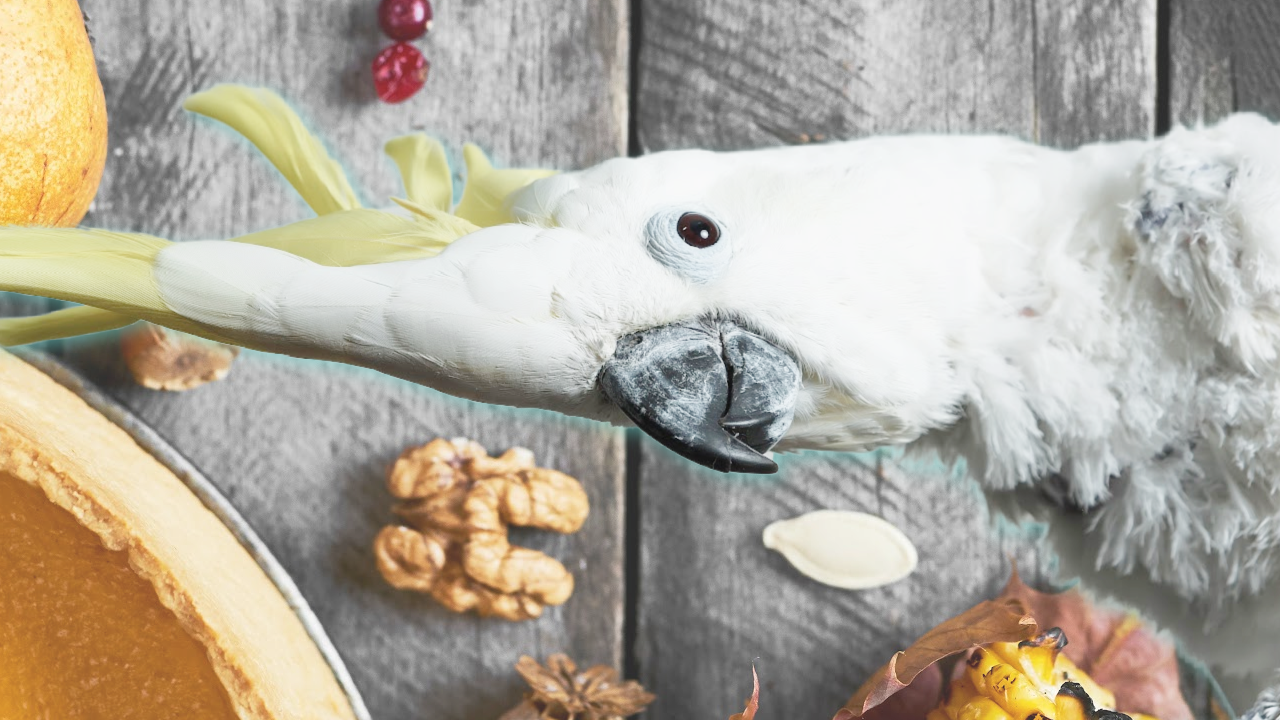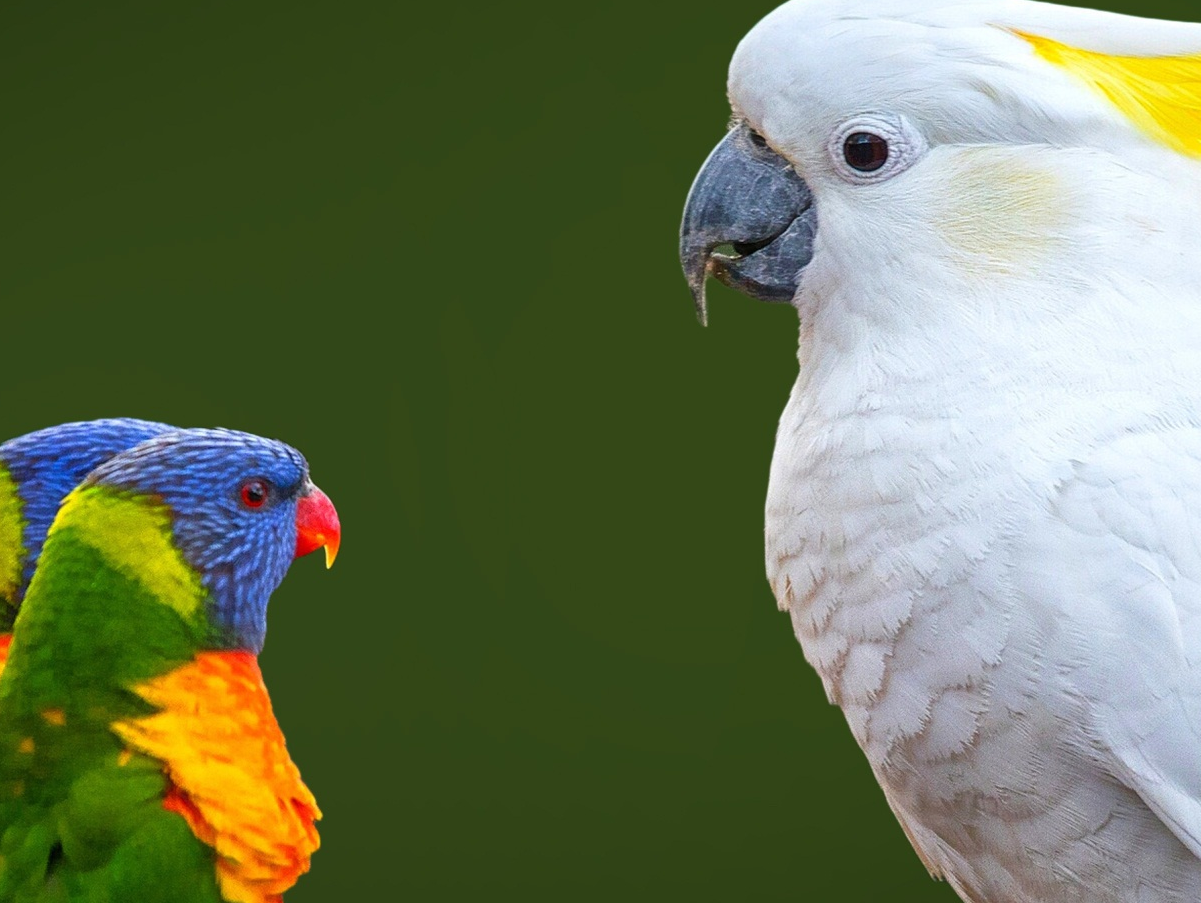Why Bird's Need Vitamins and Minerals
Malnutrition is one of the most common problems encountered by avian veterinarians. Even experienced parrot owners may skimp on foods that provide essential bird vitamins and minerals. Combine a poor diet with a picky eater and you'll see why birds need vitamins and minerals.
Up until recently, there hasn't been much research on parrot nutritional needs. But, there are a couple of excellent science-based diets like Roudybush and Harrison’s Bird Food. But, we know that simply feeding a strictly pelleted diet doesn't cut it. We know that certain nutrients are easily lost in processing pellets, like vitamins A & E, beta carotene, and some B vitamins.
Bird Complications From Deficient Vitamins & Minerals
Disease and health complications – In the wild, parrots rely on a vast range of raw vegetation to stay healthy and grow beautiful feathers. The nutrients present in a healthy diet enable their bodies to function at an optimal level able to fight off disease.
Respiratory Infections - Upper respiratory infections and secondary infections are much rarer in a parrot that gets all the right nutrients. Furthermore, a strong immune system means that even when the parrot does get sick, it is much better equipped for fighting off the disease and making a strong recovery.
Obesity – Birds can get obese and that can be dangerous. A common dietary mistake, feeding birds a diet consisting of seeds, can cause this. So can feeding fattening table foods. Unfortunately, neither of these dietary alternatives supply the range of vitamins and minerals that birds need and can in fact, lead to fatty liver disease.
Bone structure and strength – Bird bones are scientifically fascinating. They are very light making flight possible. However, they are also strong in their own right. This is possible because of their special hollow structure.
Bird bone structure uses calcium in a very efficient way to ensure that the bones are strong and healthy while maintaining their light weight. Birds therefore need a constant intake of calcium to keep those bones functioning as they should. Failure to get this calcium can lead to weak bones and eventually death.
Poor reproduction – mating is an important part of any animals life and poor diet not only interferes with the instinct but also leads to a loss of the ability. This can lead to depression seen in lethargic parrots, or aggression seen in screaming and shrieking parrots. Also, anxiety seen in feather picking parrots.
Parrot feathers - Feathers are what makes a bird a bird. They serve raincoat and keep the bird warm. Good feather health is essential to your birds well-being. New feather growth requires many nutrients, including calories, amino acids, vitamins and minerals and that's where bird vitamins for feathers come in.
Loss of flying ability – the beauty of birds has always been in the magnificence and beauty of their flight. That amazing freedom to soar that we find so alluring. Poor diet not only hampers flight due to lack of energy but can also lead to a loss of flying ability.
Birds need protein to ensure that they form the strong muscles they need for flying. However, many people do not know this and are unlikely to provide any suitable source of proteins in the meals provided. Lastly, starvation and malnutrition in some cases occurs because pet parents base their dietary allowances on domesticated animals. This is because there is little research on dietary needs of the many various species kept in the home as pets.
It is important to understand that while a chicken will only consume 6% of its body weight daily when well fed, a different pet bird such as the finch needs 30% of its body weight. Consult a veterinarian on the ideal quantity of food for your specific bird. Remember, all parrots are beautiful but not all parrots are the same; African Grey Parrots require more calcium intake than their Amazon counterparts.
5 Essential Vitamins and Minerals that Birds Need

Vitamin A Deficiency In Parrots Currumbin Valley Birds, Reptiles & Exotics Vet Surgical Removal Of Impacted Nasal Cavity Due To Vitamin A Deficiency
1. Vitamin A: This is the most common vitamin deficiency that clinics see. It is especially common in birds fed on diets consisting mostly of nuts and seeds.
Vitamin A is fat soluble that is responsible for growth and development, hormone production, immune system response, formation of epithelial, vascular, and mucous membranes. It is also responsible for good vision and it is responsible for the yellow and red pigmentation that most parrot owners love.
Bird Vitamin A Deficiency Symptoms include white spots around the beak and nasal cavity which then turn into abscesses. Other symptoms include sneezing, wheezing breathing, crusty nostrils, slimy mouths, diarrhea, dull feathers, restlessness, lethargy, loss of appetite, and gagging sounds.
Effects of Vitamin A deficiency include disorders in three essential body systems:
- Respiratory
- Digestive
- Reproductive systems.
Disorders of these systems lead to early death. The best way to enhance vitamin A is to provide your pet with a range of raw vegetables, fruits, grains, and herbs which are rich in vitamin A:
- Bell Peppers
- Spinach
- Broccoli
- Bok Choy
- Green Beans
- Kale
- Pumpkin Seeds, & more
If you have trouble feeding the full range of raw vegetables, then try a supplement like
2. Vitamin D: Just like us, birds get vitamin D from the sun. However, pet birds are kept inside most of the time leading to a deficiency. Some parrot parents assume that exposing their parrots to the sunlight by placing them next to the window is enough. But, modern windows block UV.
Vitamin D is important for parrots. It aids in absorbing and using the other nutrients in their diet. These dual processes of bio-assimilation and nutrient absorption cannot occur without Vitamin D content.
Moreover, Vitamin D is essential for the absorption of calcium which the birds need for egg production, bone formation, and regulating neurological (brain) activity.
Bird Vitamin D Deficiency Symptoms
• Easily fractured bones which may be accompanied by a significant decrease in weight indicating a decrease in overall bone strength.
• Physical abnormalities such as an overgrown or soft beak, bent keels, and splayed legs.
Low calcium levels caused by Vitamin D deficiency also may result in increased susceptibility to a wide range of cancers. Furthermore, what may seem to be eccentricities of your bird’s personality such as feather picking and a testy temperament can be caused by vitamin D deficiency. Organ disorders and immune system dysfunction are also caused by this deficiency.
How To Ensure Vitamin D In Your Bird's Diet
First things first. A great preventative measure is good diet from the start. The best choice is extruded organic pellets such as Harrison's Bird Food which provides contains vitamin D in its pellets.
But, it's not enough to make up for a vitamin D deficiency. In that case, you'd want to install a UV light for a speedy recovery. When selecting UV bulbs make sure to buy the kind that produces both UVA and UVB light.
3. Calcium: Calcium is directly tied to Vitamin D. If a bird has a vitamin D deficiency, it likely has low calcium levels, too. It is important that you know that African Grey parrots are prone to Calcium deficiency and require supplementation in their diets.
Calcium is needed for blood clotting, muscle function, and formation of egg shells, bones, and attachment of feathers. On top of that, calcium is essential for certain neurotransmitters in the brain. This means that calcium and mood are highly linked.
Keep in mind that Calcium needs vitamin D3 and Magnesium to be absorbed. For peace of mind, get a complete avian calcium supplement like
4. Other vitamins: B, E, K, C Vitamins are usually categorized into water and fat soluble vitamins. Fat soluble are stored in the bird’s body’s fat and can cause toxicity in high amounts while water soluble ones are passed out when the bird eliminates.
Fat soluble vitamins are A, D, E, and K while water soluble vitamins are thiamin (B1), riboflavin (B2), niacin, pyridoxine (B6), pantothenic acid, biotin, folic acid, vitamin B12, choline, and vitamin C (ascorbic acid). A quick overview of why each of these is needed;
- Thiamin – transmission in the nervous system; deficiency causes restlessness, feather picking, shrieking, and seizures.
- Riboflavin – formation and action of enzymes; deficiency leads to poor growth, rough and dry skin.
- Niacin – energy production and tissue formation; deficiency causes neurological symptoms and poor growth.
- Pyridoxine – amino acid utilization and antibody formation; deficiency causes immune dysfunction.
- Pantothenic acid and biotin – metabolic reactions, enzyme formation, and carbon dioxide metabolism; deficiency causes metabolic system disorders.
- Folic acid – production of amino acids and antibodies; deficiency causes immune disorders.
- B12 – important for metabolic processes and formation of proteins, nucleic acid, carbohydrates, and fat; deficiency leads to metabolic disruption and death.
- Ascorbic acid – enzymatic reactions for maintaining collagen and elastin in walls of blood vessels. How to treat deficiencies in parrots.
Deficiencies of important vitamins can be properly diagnosed by an avian veterinarian.

5. Amino acids Amino acids are the building blocks of proteins. These are an essential part of a healthy and nutritional bird diet. Amino acids and proteins are needed for feather, bone, muscle, enzyme, and hormone formation. Lack of protein and amino acids leads to poor growth and eventually death of the parrot.
Remember, proteins are the building blocks of muscle and are therefore needed at all stages of muscle formation. Additionally, deficiency in proteins can weaken certain part of the bird’s body such as the wings. This can lead to a temporary and in some cases permanent loss of flight abilities.
HOW TO TREAT DEFICENCY
Small live organisms, boiled eggs, and monkey biscuit are a great way to provide protein supplements. The case for pellets Just like children birds are picky eaters; they will selectively eat what they like the taste of and avoid what they do not enjoy.
However, pellets Harrison's Bird Food provide an organic, balanced, yet tasty way of ensuring that your beloved parrot is getting the full range of nutrients it needs. Pass this blog along to help insure parrots get enough bird vitamins for a healthy, happy life.
Got a great nutritious recipe that your bird gobbles up? Share it with your fellow readers!






5 comments
GIRISH
Pls send the details
Pls send the details
Myra
My 7 year old African Grey is quite healthy Are there any organic vitamin supplements??
My 7 year old African Grey is quite healthy Are there any organic vitamin supplements??
Jihad
I have a baby parrot. What are the food may give them. If may I give baby cerlac or powder of green gram, red rose rice, and ground corn
I have a baby parrot. What are the food may give them. If may I give baby cerlac or powder of green gram, red rose rice, and ground corn
Cathy
Does birds needs collagen?
Does birds needs collagen?
Lilian Posada
Due to lack of funds I have not been able to take my Quaker bird to the vet ,he is showing problems with his beak,does not play anymore.
Due to lack of funds I have not been able to take my Quaker bird to the vet ,he is showing problems with his beak,does not play anymore.